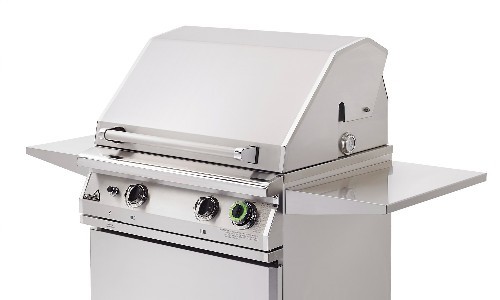6-minute read
|
Cooking Equipment
When it comes to outdoor cooking, a grill is more than just a tool—it’s a gathering point for friends, family, and guests alike. Whether you’re at a hotel, restaurant, or apartment complex, having a commercial-grade grill can significantly enhance the appeal of any communal space. The ability to cook outdoors draws in everyone from seasoned grill masters to those who are just starting out. But choosing the right grill for such settings involves more than just aesthetics—there are practical considerations too. One of the first questions to ask is whether the grill should be stationary or portable. Additionally, the size of the cooking surface and the number of cooking levels are essential factors to consider. However, the most crucial decision lies in determining the type of fuel that powers the grill. In a shared environment, convenience is key, and charcoal grills fall short in this regard. Charcoal creates a significant mess—its dust and residue can easily transfer to hands, clothes, and cooking surfaces. Lighting charcoal can also be a hassle, requiring lighter fluid or chemically treated briquettes that lead to unpredictable flare-ups. These sudden flames disrupt even cooking temperatures and impart an undesirable burnt flavor to food. After a barbecue, cleaning up leftover ash from a charcoal grill is another challenge. The coals must cool down completely before handling, and proper disposal requires careful management. Furthermore, the constant need to refill charcoal adds up financially over time. On the flip side, gas grills eliminate these frustrations entirely. Both natural gas and propane-powered grills provide a cleaner, simpler, and more reliable alternative compared to their charcoal counterparts. With gas grills, there’s no mess to deal with. They ignite effortlessly and maintain consistent heat levels, making them ideal for large gatherings. Switching on a gas grill takes mere seconds via a switch, and it heats up almost instantly. This rapid startup cuts down preparation time significantly. Unlike charcoal, which relies on airflow to burn evenly, gas burns cleanly and consistently, ensuring that food doesn’t pick up any unwanted chemical tastes. Gas is also cost-effective. Tied into a natural gas line, a grill never runs out of fuel. For those using liquid propane tanks, replacements are readily available at local stores. Plus, both types of gas are relatively inexpensive compared to the ongoing costs associated with purchasing charcoal. Gas grills offer endless customization possibilities through various accessories. Options like infrared rotisserie burners add a professional touch to meat dishes, while side burners keep sauces hot and accessible. Ceramic briquettes help distribute heat more evenly across the cooking surface. Additional features like stainless steel shelves and storage drawers transform the surrounding area into a well-organized workspace. These conveniences simply aren’t possible with a charcoal grill setup. Another standout feature for property managers is the one-hour timer that automatically shuts off the gas supply after an hour. This prevents accidental overuse and ensures safety overnight. For multi-family properties such as apartment complexes or resorts, commercial-grade gas grills are the go-to solution. These grills are designed to withstand heavy usage by multiple cooks. Unlike residential grills, which are typically used by individual households, community grills face wear and tear from countless users daily. PGS commercial gas grills are crafted from top-tier materials inside and out. Their stainless steel cooking grids ensure durability and longevity. Available in various sizes and BTUs, T-Series models cater to diverse needs. Some units even come equipped with anti-theft knobs and permanent laser-engraved instructions that resist fading. Installation flexibility is another advantage of PGS T-Series grills. Permanent pedestal mounts keep them fixed in place, while mobile carts allow for versatile placement within community areas. Alternatively, certain models integrate seamlessly into masonry structures. No matter the setting, there’s a gas grill tailored to meet the demands of any shared space. Grilling with either natural gas or propane is an environmentally friendly choice. Not only does it reduce waste compared to charcoal, but it also leaves a smaller carbon footprint. After grilling with gas, there’s no pile of ash to dispose of, unlike the cleanup required after using charcoal briquettes. When it comes to ease of use, gas grills reign supreme. With just a flick of a switch, they ignite almost instantly, eliminating the need for cumbersome fire starters or complex charcoal arrangements. Controlling the flame is as simple as turning a knob, allowing chefs to extinguish the heat immediately if needed. Regardless of who operates it, a commercial gas grill delivers consistent results every time. Chefs can expect uniform cooking temperatures and predictable outcomes, no matter how busy the schedule gets. PGS T-Series Commercial Grills are built for community kitchens. Made with superior craftsmanship and durable materials, these grills are available in both natural gas and propane variants. They can be installed permanently, integrated into outdoor kitchens, or set up as portable units. The built-in 60-minute timer ensures peace of mind by preventing prolonged operation. Need more details? Have questions? Contact us today, and we’ll be glad to assist! Stud Bolt,Stud Screws,Metric Stud Screws,Stud Bolts Suzhou Chenran Precision Fasteners Co., Ltd. , https://www.chenranfastener.comGas Grills: The Clean, Convenient, and Consistent Choice for Commercial Kitchens

Gas Grills vs. Charcoal Grills
Customizing Your Grill
Choosing the Right Commercial Grill
A Cleaner Option
A More Convenient Solution
A More Consistent Experience
Go Back To Blog